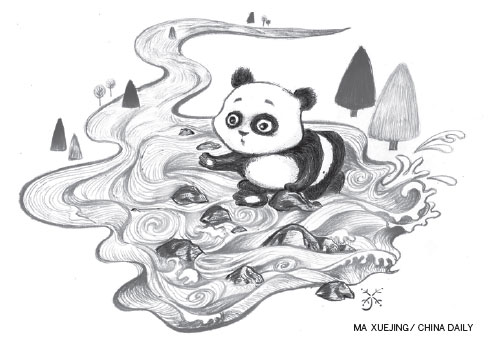Feel stones to cross economic river
Updated: 2015-03-31 08:25
By Andrew Sheng and Xiao Geng(China Daily)
|
||||||||
 |
China's leaders are taking action to support the shift to a more sustainable growth model. But not everyone is optimistic. Veteran China watcher David Shambaugh recently warned that the challenges facing the political system, led by the Communist Party of China, may be severely compromising the government's ability to implement the package of ambitious economic reforms announced in 2013.
Yet the claim that China's economic and political development is in jeopardy seems to ignore the country's adaptive learning process, which shapes every economic, diplomatic, military and social policy. This process - characterized by experimentation, assessment and adjustment - emerged from the CPC's military experience of the 1930s, was applied by Deng Xiaoping to his reform program in the 1980s, and has been refined by subsequent Chinese leaders. Because no economy had ever experienced such rapid growth on such a large scale, the only way to manage China's development is, as Deng put it, to "cross the river by feeling the stones".
China's adaptive policymaking approach has produced both spectacular failures, with entire markets being shut down, and remarkable success, yielding models that could be applied across the country. Some experiments have had less clear results, making, say, a positive contribution to GDP growth, but also contributing to problems like excess industrial capacity, pollution, corruption and the creation of ghost towns.
In a context of experimentation, such unintended consequences are understandable. The mere fact that they have emerged in no way suggests that China is headed for disaster; that would be the case only if these problems were allowed to persist.
To prevent such an outcome, China has to ensure its "new normal" goes beyond policies intended to sustain economic growth. Reforms must aim to bolster inclusiveness, advance environmental sustainability, promote innovation and boost competitiveness. And this is precisely the four-pronged approach that China's leaders seem to be taking.
Indeed, from slashing coal consumption to addressing air pollution to plans for integrating information technologies with modern manufacturing, China has shown time and again that it recognizes its reform imperatives. And by remaining dogged in its efforts to root out official graft, it has demonstrated its will to do what is needed to ensure success.
- Global health entering new era: WHO chief
- Brazil's planning minister steps aside after recordings revelation
- Vietnam, US adopt joint statement on advancing comprehensive partnership
- European border closures 'inhumane': UN refugee agency
- Japan's foreign minister calls A-bombings extremely regrettable
- Fukushima impact unprecedented for oceans: US expert

 Stars of Lijiang River: Elderly brothers with white beards
Stars of Lijiang River: Elderly brothers with white beards
 Wealthy Chinese children paying money to learn British manners
Wealthy Chinese children paying money to learn British manners
 Military-style wedding: Fighter jets, grooms in dashing uniforms
Military-style wedding: Fighter jets, grooms in dashing uniforms
 Striking photos around the world: May 16 - May 22
Striking photos around the world: May 16 - May 22
 Robots help elderly in nursing home in east China
Robots help elderly in nursing home in east China
 Hanging in the air: Chongqing holds rescue drill
Hanging in the air: Chongqing holds rescue drill
 2.1-ton tofu finishes in two hours in central China
2.1-ton tofu finishes in two hours in central China
 Six things you may not know about Grain Buds
Six things you may not know about Grain Buds
Most Viewed
Editor's Picks

|

|

|

|

|

|
Today's Top News
Liang avoids jail in shooting death
China's finance minister addresses ratings downgrade
Duke alumni visit Chinese Embassy
Marriott unlikely to top Anbang offer for Starwood: Observers
Chinese biopharma debuts on Nasdaq
What ends Jeb Bush's White House hopes
Investigation for Nicolas's campaign
Will US-ASEAN meeting be good for region?
US Weekly

|

|









